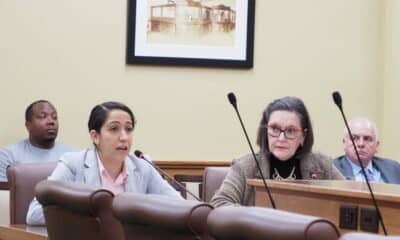Mississippi Today
Mississippi could suffer the most if health insurance subsidies lapse

A new report warns Mississippi could see the steepest drop off in health insurance coverage if Congress doesn’t vote to extend temporary health coverage subsidies at the end of next year.
Over 100,000 Mississippians would lose health insurance – a 43% increase in the state’s already-high uninsured rate – the policy think tank The Urban Institute predicted last month.
“If the enhanced premium tax credits expire, there will be dramatic declines in Marketplace coverage and increases in uninsurance, but the effects will not be felt equally across states or by race, income, and age,” said Jessica Banthin, senior fellow at the Urban Institute in a statement. “Our analysis shows that their expiration could mean some communities may experience greater coverage losses, making healthcare unaffordable and inaccessible.”
The increased subsidies allow Americans to buy health insurance plans on the Affordable Care Act Marketplace at lower costs with enhanced premium tax credits. The benefits were first authorized by Congress in 2021 to help more Americans attain health care coverage during the COVID-19 pandemic.
They also allowed more Americans than before to access the premium tax credits by raising the income ceiling for eligibility and allowed low-income households to access insurance without paying premiums.
The benefits, which have led to a record high of 21.3 million people insured through the Marketplace nationwide, will expire in December 2025 without a renewal from Congress.
“If (the premium tax credits) go away next year, I’m afraid it will reset us to where we were five years ago, with the Marketplace policies basically becoming catastrophic plans again,” State Health Office Dr. Daniel Edney told Mississippi Today.
Catastrophic plans are designed to cover major medical emergencies but not routine medical care.
Premium payments are expected to increase by over 75% on average if the tax credits expire.
For a 40-year-old living alone in Jackson and making $30,000 annually, the cost of monthly premiums for a silver health insurance plan would rise $93 a month, from $49 to $143, according to KFF.
The Marketplace is a federally or state-operated health insurance exchange where people can shop for and enroll in coverage and access financial assistance based on their income.
The enhanced tax credits have contributed to a significant increase in health care coverage in Mississippi since 2021.
In 2020, 12.9% of Mississippians were uninsured, compared to 10.5% in 2023.
“It’s been a gamechanger,” said Edney.
Health care coverage through the Marketplace in Mississippi has nearly doubled since the benefits were passed, representing the second highest percent increase in the nation behind Texas.
Mississippi remains one of 10 states in the nation not to expand Medicaid coverage, making it more reliant on the Marketplace for affordable health care coverage. Marketplace enrollment rates since 2020 have grown fastest in states with high uninsured rates that have also not expanded Medicaid.
The Urban Institute’s data tool predicts that if the enhanced tax credits are not renewed, 143,000 Mississippians would lose coverage under subsidized Marketplace plans.
Some would have the option to enroll in employer-sponsored coverage or be able to afford health insurance without the additional benefits. But most are forecasted to lose coverage entirely.
Mississippi currently uses the federal exchange, but the Legislature passed a law authorizing the creation of a state-based Marketplace earlier this year, which could incentivize health insurance companies to offer policies at lower costs. But federal officials will not approve Mississippi implementing its own exchange because Gov. Tate Reeves has not yet provided a letter of approval.
This article first appeared on Mississippi Today and is republished here under a Creative Commons license.![]()
Mississippi Today
Fatalities reported in UMMC helicopter crash

An AirCare helicopter from the University of Mississippi Medical Center crashed near the Natchez Trace Parkway this afternoon.
A Madison County official confirmed to WLBT that there were fatalities. They were quoted saying, “We are on the scene of a medical helicopter crash in a heavily wooded area south of the Natchez Trace and north of Pipeline Road. There are fatalities. We are now awaiting the arrival from the FAA. Any other information should come from them.”
At the time of publication, authorities have not revealed how many fatalities or identified them. In an email, Vice Chancellor for Health Affairs Dr. LouAnn Woodward stated, “Two UMMC employee crew members and a Med-Trans pilot were on board. There was no patient aboard.”
The helicopter crashed in a heavily wooded area near the Natchez Trace Parkway and Highway 43. Madison County Sheriff’s Office, Gluckstadt Fire Department and several other first responders are at the scene.
UMMC’s flight program, AirCare, includes helicopters based in Jackson, Meridian, Columbus and Greenwood. The helicopters are used to transport patients to and from UMMC and other hospitals.
This article first appeared on Mississippi Today and is republished here under a Creative Commons license.![]()
Mississippi Today
‘Not COVID. It’s Trump’: Lawmakers prepare for tumultuous Trumpenomics by … upending state tax structure

In an exchange on the floor of the Mississippi Senate last week, lawmakers debated the economic uncertainty coming from the Trump administration’s burgeoning trade war and helter-skelter policy decisions.
“You never know what’s going to happen with — you know, what we’re going through with increases in cost for things, whether it’s guardrails or bolts or whatever,” said Transportation Chairman Chuck Younger, a Republican from Columbus. He was outlining a bill that would increase the amount of money MDOT could add to a road contract without rebidding from $100,000 to $250,000. This, he said, would prevent highway projects facing long delays from potential huge increases in cost of materials.
“But we’re not in COVID any more, we shouldn’t have those supply chain problems,” said Sen. Angela Hill, R-Picayune, questioning the need for the measure.
“No, we’re not (in) COVID. It’s Trump, and we’re going through all these tax things (tariffs) that are going through for other countries,” Younger said. “… It’s fixing to happen.”
Mississippi is a poor state with a fragile economy. There’s an old adage that we’re usually “first in and last out” of a national recession, and another that, “What other states call a recession, we call Tuesday.”
Some of Trump’s threatened or enacted policies, tariffs and slashing of federal spending appear tailor-made to hammer Mississippi’s economy.
But staring down the barrel of potential economic chaos or calamity, Mississippi lawmakers are not drastically cutting spending, hoarding tax dollars or even proceeding with caution. Their main focus this legislative session is a total overhaul of the state’s tax structure including massive tax cuts combined with fairly massive tax increases — an unprecedented economic experiment betting that the state’s fortunes will rise and cover the spread.
Mississippi, under one plan, would become the first state ever to eliminate an existing individual income tax, which accounts for nearly one-third of the revenue that funds state government. Increases in sales and gasoline taxes would shift the tax burden to use or consumption taxes — a move some point out would be regressive, hitting poor people, of which Mississippi has many, hardest.
What could go wrong?
For starters, Mississippi is perennially among the most federally dependent states, with more than 40% of its annual budget coming from federal dollars and the state receiving nearly a 3-to-1 return for every dollar in federal taxes it pays. The trillions of dollars in cuts to federal spending Trump and Elon Musk are promising with the Department of Government Efficiency could easily cripple Mississippi’s economy.
Agriculture is, depending on how you measure, Mississippi’s No. 1 industry. Trump’s proposed trade war with other countries and other policies could hit Mississippi farmers hard. Already, China has announced retaliatory tariffs on soybeans, chicken and other products Mississippi grows. In a smaller scale trade war in his first term, Mississippi farmers lost nearly $270 million in profits from soybeans and cotton from Chinese tariffs and fallout. U.S. taxpayers later had to bail farmers out from that smaller-scale trade war in Trump’s first term.
Mississippi might not have the direct exposure to tariffs as some states, but it is the 22nd largest exporter of agriculture products and 31st of other goods. In 2024, Mississippi exports totaled $13.7 billion, and they make up about 10% of the state’s GDP. Canada is perennially the state’s top trading partner, with Mexico also usually in the top three, and Mississippi also exports chicken and soybeans to China. Reductions in exports or other fallout from Trump’s promised trade wars with Canada, Mexico and China could be devastating for the Magnolia State.
The list goes on for potential impact of Washington’s moves on Mississippi.
Mississippi has long been in the automobile manufacturing business, with large Nissan and Toyota plants. Experts are warning Trump tariffs on Mexico and Canada could almost instantly cause North American auto production to drop by a third, cause massive layoffs and even closure of plants.
Mississippi leaders have recently celebrated several large economic development wins, including the state landing a massive aluminum rolling mill in Columbus. Mississippi taxpayers invested $247 million in state incentives to land a $2.5 billion investment from Steel Dynamics. The company’s goal is to provide more aluminum and steel for auto manufacturing, and the Columbus site will work along with satellite recycling centers in the U.S. and Mexico. While some speculate Steel Dynamics might benefit in the long run from Trump tariffs on Chinese steel, tariffs coming and going from Mexico and upheaval in the auto industry could impact one of Mississippi’s biggest economic development wins.
Another recent economic development coup for Mississippi is the Amplify Cell Technologies plant. The $2 billion to $3 billion joint venture including Daimler Trucks and China-based EVE Energy, helped by $482 million in state tax incentives, plans to produce electric vehicle batteries by 2027. Such projects were a result of Biden-era subsidies and rules promoting a switch to electric vehicles. Trump has vowed to roll back these subsidies and rules.
Mississippi has also celebrated Amazon’s commitment to spend an estimated $16 billion over 10 years to build two huge Amazon Web Services data centers in Madison County. It’s hailed as “the single largest capital investment in Mississippi history.” Mississippi taxpayers have provided $278 million in incentives and hundreds of millions in tax breaks and exemptions for the centers.
AWS is a subsidiary of Amazon, and some say AWS could help insulate it from tariffs to and from China. But the mother company is a retailer with massive exposure on about 25% of the goods it sells. And spikes in construction and materials costs on a $16 billion project are not to be taken lightly.
The AWS centers also hinge on a $2 billion to $3 billion deal with Entergy for the power company to up its game to feed the massive power needs. Renewable energy — of which Amazon is a big proponent — is a major part of that plan for powering the AWS centers. Besides that, Mississippi has seen major development in solar and wind production. Around 40 solar farms have been approved for construction and operation in Mississippi.
But the Trump administration has vowed to reverse course from the Biden administration’s policies and spending on renewable energy. This includes an executive order to suspend spending from the Inflation Reduction and Infrastructure acts, and the Trump EPA is fighting about $20 billion Biden allocated to clean energy.
Energy production and costs, at least in the short term, are in limbo like everything else with the new administration’s maneuvers.
So, apparently, is expansion of broadband internet, which Mississippi leaders have heralded as a game changer for a poor, rural state on the magnitude of electrification in the 1920s and ’30s. On his first day in office, Trump put funding for broadband expansion, including Mississippi’s $1.2 billion plan, in question with an executive order.
Trump has warned that Americans may feel “a little pain” from his economic and spending policies in the short term. But Mississippi is positioned to potentially feel great pain with an economy less diversified than others and the state struggling with generational poverty.
But Mississippi lawmakers and Gov. Tate Reeves appear nonplussed by this. They are forging ahead with one of the biggest economic experiments in history, betting that revenue largely from sources Trump is vowing to stifle will continue to grow.
Reeves has recently on social media said, “Mississippi’s economy is on fire!” There’s a potential, with looming trade wars, other D.C. policy and a state tax experiment, for that to take on a new meaning.
This article first appeared on Mississippi Today and is republished here under a Creative Commons license.![]()
Mississippi Today
Are House leaders rubber stamping some bills without apparent committee support? Legislative recap
Are House leaders rubber stamping some bills without apparent committee support? Legislative recap
“Noooo!” the vast majority of House State Affairs Committee members shouted for voice votes on two controversial bills aimed at overhauling the state employee retirement system last week.
Despite what sounded like no more than one or two of the 11 members present saying “Yes,” Committee Chairman Hank Zuber, R-Ocean Springs, ruled each time that the yeses had it. The bills were moved forward. He ignored pleas from several members, including his committee Vice Chairman Robert Johnson, D-Natchez, calling for real vote counts.
A similar “vote” transpired in the House Education Committee recently, with members’ pleas to Chairman Rob Roberson, R-Starkville, for a real vote count being ignored on a hot-potato bill and a voice vote sounding uncertain.
This has drawn criticism from some lawmakers and advocates and renewed questions of whether committee hearings and votes are just to rubber stamp what legislation the GOP leadership has decided it wants to move forward.
In recent years, particularly in the House, publicly held committee hearings and votes have become pro forma. Real decisions appear to be hashed out, and straw polled, in closed door Republican Caucus meetings.
And given the GOP holds a supermajority, it’s akin to the House holding secret sessions and votes on legislation.
Also recently, in a lawsuit brought by the Mississippi Free Press over the closed-door caucus meetings, a Hinds County judge ruled the Legislature is not subject to the state’s open meetings law — that the Legislature imposes on other state and local government bodies.
These are ill omens for the public and press and their right to witness what their elected lawmakers are doing, including how they spend billions of tax dollars. It also concentrates legislative power to a very small handful of folks, and it strips rank-and-file lawmakers of input or even the ability to speak out on issues.
Vice Chairman Johnson, who’s also House minority leader, said he believes House rules require chairmen to allow a roll-call or counted vote when requested. But House Speaker Jason White, Zuber and others have argued that’s not the case.
House rules are unclear or conflicting. One passage says the House shall allow “division” or a counted vote if 1/5 of members demand it. Another says committees will follow the rules for the full House, but then goes on to make that sound optional.
Johnson, along with opponents of the PERS changes in the two bills, which included some of the universities’ lobby, were angry and cried foul after the non-vote votes.
“Most committee chairmen have always abided by, if one person wants a roll call, they do it,” Johnson said. “There were only 11 members in the room, and you heard it, several called for a roll call. This is the second time this session this has happened.
“Now you can’t even vote in committee,” Johnson said. “We have not formally addressed this with the speaker yet, but I think we will. We just can’t operate that way.”
Oddly, the two PERS bills that caused the dustup both died — without a vote — after they were forwarded to another committee. Apparently a tentative deal the leadership had on the measures fell through, so the chairman of the second committee let them die with a deadline without calling them up.
WATCH
Quote of the Week
“I want my sweet potato. Everybody got one but me. Somebody stole mine. I want it back.” — Rep. Willie Bailey, D-Greenville, in a committee meeting last week before a vote on a measure to make the sweet potato the official state vegetable. Before an earlier House vote weeks ago, sweet potatoes were placed on lawmakers’ desks.
In Brief
Clark laid in state at Capitol
Robert Clark, elected in 1967 as Mississippi’s first Black lawmaker in the modern era and who rose to the second-highest leadership role in the state House of Representatives, laid in state at the Mississippi Capitol on Sunday.

Hundreds came to the Capitol to pay tribute to Clark who was a lifelong advocate for public education and Black representation in state and local government. As chairman of the House Education Committee, he played an instrumental role in the transformational Education Reform act of 1982 that saw the establishment of public Kindergarten statewide.
House Speaker Jason White, who is also from Clark’s native Holmes County, told House members last week that Clark was “a trailblazer and icon for sure”who had always been gracious to him. The House and Senate last week held a moment of silence in his honor. — Taylor Vance
Paid family leave bills survive
Two bills to create paid family leave for state employees survived a crucial deadline in the Legislature.
Both bills would give state employees who are primary caregivers six weeks of paid leave – although the original House version offered eight weeks for primary caregivers and two weeks for secondary caregivers.
If either bill is signed into law, it would apply to employees working for state government agencies but would not include public school teachers. – Sophia Paffenroth
DEI restrictions to be ironed out in conference
Senate and House lawmakers aim to negotiate in conference a final proposal to eliminate diversity, equity and inclusion programs from the state’s public schools.
One sticking point between the chambers is whether to keep legislation aimed at the state’s universities and colleges, as the Senate bill does, or to include K-12 schools, as the House bill does.
The Senate Universities and Colleges Committee this week inserted language from the Senate DEI ban into the House bill, while the House let the Senate bill die. The move sets up negotiations down the road in a conference committee.
The measures passed by each chamber differ in who they would impact, what activities they would regulate and how they aim to reshape the inner workings of the state’s education system. The Senate bill also would create a task force to look for inefficiencies in the state’s higher education system. The House bill contains a provision that would force all public schools to teach and promote that there are two genders. It also threatens to withhold state funds based on complaints that anyone could lodge. – Michael Goldberg
Medicaid expansion vehicle alive; passage unlikely
One bill that could act as the vehicle for Medicaid expansion is alive in the Legislature, though lawmakers have made it clear that expansion is unlikely to come up this year with a sea change to Medicaid funding expected to take place under the new Trump administration.
Senate Bill 2386 is a “dummy bill,” meaning it brings forth the necessary code sections to expand Medicaid eligibility, but includes no details on the policy. – Sophia Paffenroth
Lawmakers trying to revive PBM measure
A bill pushed by pharmacists that would have strengthened regulation of pharmacy benefit managers died on Tuesday in the House, but Senate Public Health and Welfare Committee members have proposed adding its language to a similar House bill with a strike-all amendment.
Pharmacists prefer the Senate’s language because it would tighten appeal procedures, ensure pharmacy benefit managers promptly pay certain claims, and mandate that affiliate pharmacies are not paid more for dispensing drugs than other pharmacies. – Gwen Dilworth
Nurse scope of practice legislation dies
Legislation that would have allowed advanced practice nurses and certified registered nurse anesthetists with a certain amount of training to practice without a collaborative agreement with a physician died on Tuesday.
After strong lobbying against the bill from the Mississippi State Medical Association and other physicians, House Bill 849 died in the Senate Public Health committee on Tuesday. – Kate Royals
Postpartum depression screening bill dies
A bill authored by Sen. Nicole Boyd, R-Oxford, that would require health care providers screen mothers for postpartum depression and prohibit insurance companies from implementing step therapy protocol for FDA-approved postpartum depression drugs also died on deadline day.
House Accountability, Efficiency and Transparency Chair Kevin Ford, R-Vicksburg, did not bring up SB 2874 in his committee. – Kate Royals
Senate trying to revive CON reform
A bill that would have reformed the state’s certificate of need law died, but the Senate Public Health and Welfare committee proposed that some of the bill’s language be added as a strike-all amendment to HB569.
The prevailing proposal would raise the capital expenditure limits for health care facilities and order the Mississippi State Department of Health to study the exemption of small hospitals from being required to acquire a “certificate of need” from the state to open dialysis and geriatric psychiatric units.
It would also require the department to study the feasibility of requiring acute adult psychiatric units to treat a certain percentage of uninsured patients and exempt the University of Mississippi Medical Center from certificate of need requirements in a certain area in Jackson. – Gwen Dilworth
By the Numbers
479
The number of bills alive in the Legislature after last week’s committee passage deadline, according to Mississippi Statewatch legislative tracking service. Normally, at this point in a legislative session, there would be hundreds more alive. Senate committees last week killed 85 bills the House had passed, and House committees killed 105 bills the Senate had passed. There were 3,216 bills introduced this session.
Full Legislative Coverage
New Mississippi legislative maps head to court for approval despite DeSoto lawmakers’ objections
Voters from 15 Mississippi legislative districts will decide special elections this November, if a federal court approves two redistricting maps that lawmakers approved on Wednesday. Read the story.
Lawmakers honor longtime journalist Emily Wagster Pettus
The Mississippi Legislature on Thursday honored longtime, award-winning journalist Emily Wagster Pettus for her decades of legislative news coverage. Read the story.
PERS overhaul sputters: Securing the future, or giving new state employees ‘worst of both worlds’?
Proponents say failing to make major changes now endangers current employee and retiree benefits and taxpayers down the road. Opponents say drastically reducing benefits for future state employees will make it impossible to recruit, and especially retain, teachers, police and others in relatively low-paying government jobs. Read the story.
Senate says ‘school choice’ transfer bill is dead as House tries last ditch effort to save it
A bill that would make it easier for K-12 students to transfer to other public schools outside their home districts will die in the Mississippi Senate, the chamber’s leaders said as a Tuesday night deadline loomed. Read the story.
House chairman pushes for absentee ballot expansion instead of early voting
Elections Committee Chairman Noah Sanford has successfully pushed some House members to scrap a Senate proposal to establish early voting in Mississippi and expand the state’s absentee voting program instead. Read the story.
Trailblazing Mississippi lawmaker Robert Clark dies
Robert Clark, the first Black person elected to the Mississippi Legislature in the modern era, has died at age 96. Read the story.
Mississippi lawmakers keep mobile sports betting alive, but it faces roadblock in the Senate
A panel of House lawmakers kept alive the effort to legalize mobile sports betting in Mississippi, but the bill does not appear to have enough support in the Senate to pass. Read the story.
House absentee voting plan might still require voters to lie
The worst-kept secret about Mississippi’s elections is that any voter can vote by absentee each cycle if they are willing to lie. Read the story.
Key lawmaker reverses course, passes bill to give poor women earlier prenatal care
A bill to help poor women access prenatal care passed a committee deadline at the eleventh hour after a committee chairman said he wouldn’t bring it up for a vote. Read the story.
Legislation to license midwives dies in the Senate after making historic headway
A bill to license and regulate professional midwifery died on the calendar without a vote after Public Health Chair Hob Bryan, D-Amory, did not bring it up in committee before the deadline Tuesday night. Read the story.
Podcast: Mississippi Legislature enters homestretch, still facing uncertainty from Trump admin maneuvers
Mississippi Today’s politics team outlines some challenges lawmakers face in the final month of their session from uncertainty of the affects Trump administration moves will have on the state level. They also discuss what lived and died with last week’s deadline for committee passage. Listen to the podcast.
This article first appeared on Mississippi Today and is republished here under a Creative Commons license.![]()
-

 News from the South - Louisiana News Feed5 days ago
News from the South - Louisiana News Feed5 days agoRemarkable Woman 2024: What Dawn Bradley-Fletcher has been up to over the year
-

 News from the South - Oklahoma News Feed2 days ago
News from the South - Oklahoma News Feed2 days agoFeed the Children rolls out new program to help Oklahoma families
-

 News from the South - Oklahoma News Feed4 days ago
News from the South - Oklahoma News Feed4 days agoMarch 6,2025: Rain and snow on the way
-

 News from the South - Texas News Feed5 days ago
News from the South - Texas News Feed5 days agoTravis County DA failed to meet deadline to indict murder suspect | FOX 7 Austin
-

 Mississippi Today3 days ago
Mississippi Today3 days agoJudge tosses evidence tampering against Tim Herrington
-

 Mississippi Today6 days ago
Mississippi Today6 days agoKey lawmaker reverses course, passes bill to give poor women earlier prenatal care
-

 News from the South - Florida News Feed5 days ago
News from the South - Florida News Feed5 days ago64-year-old woman injured after car crashed into her mobile home in Zephyrhills
-

 News from the South - Arkansas News Feed7 days ago
News from the South - Arkansas News Feed7 days agoPanel OKs proposed removal of racial and gender quotas for Arkansas boards and commissions


















































